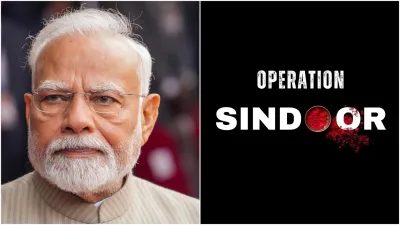In a bold and unprecedented move, the Indian armed forces launched Operation Sindoor on May 6—a meticulously planned surgical airstrike campaign targeting terror infrastructures deep inside Pakistan and Pakistan-administered Kashmir. The operation marks a significant shift in India’s counterterrorism strategy, underlining its resolve to fight cross-border terrorism while positioning itself as a responsible regional power.
The military action was triggered by the devastating terror attack on April 22 in Pahalgam, Jammu and Kashmir, where 26 Hindu pilgrims lost their lives in a bus explosion. The Resistance Front, a Pakistan-backed terror outfit, was held responsible by Indian intelligence agencies, prompting the need for a swift and targeted response.
Precision Strikes with Strategic Messaging
The Indian Air Force deployed state-of-the-art fighter jets, including Rafales and Su-30MKIs, to carry out coordinated strikes on nine locations identified as key training and logistics hubs for terrorist outfits such as Jaish-e-Mohammed and Lashkar-e-Taiba. These included camps in Bahawalpur, Kotli, and Muzaffarabad.
According to defense officials, the operation was carefully calibrated to minimize civilian casualties. “Our aim was not to escalate conflict, but to neutralize threats at their origin. Operation Sindoor was a defensive, preemptive action to ensure the safety of our citizens,” said Air Chief Marshal Arvind Kapoor during a media briefing in New Delhi.
Global Reactions and Political Impact
The operation has drawn strong reactions both at home and abroad. Domestically, political parties across the spectrum have united in support of the armed forces. Prime Minister Narendra Modi, addressing the nation, stated, “India does not seek war, but we will not tolerate the spilling of innocent blood. Operation Sindoor is our message: terror will be answered with precision and resolve.”
Opposition leaders echoed similar sentiments, urging diplomatic caution while praising the armed forces for their professionalism.
On the global stage, reactions have been mixed. The United States and France urged both India and Pakistan to exercise restraint and de-escalate tensions, while also acknowledging India’s right to self-defense. China, Pakistan’s close ally, expressed concern and called for peaceful dialogue between the two countries.
Crisis at the Border and Humanitarian Concerns
Following the strikes, Pakistan claimed to have lost several civilians and condemned the action as a violation of its sovereignty. Military movements along the Line of Control have intensified, and airspaces near the borders have been temporarily restricted. Authorities on both sides have placed emergency services on high alert.
While India maintains that the strikes were clean and did not affect civilian areas, concerns remain about potential retaliation. The Indian Army has increased deployment in key border sectors and activated air defense systems.
Technology and Intelligence: A New Era of Warfare
What sets Operation Sindoor apart is the extensive use of satellite surveillance, cyber intelligence, and real-time reconnaissance drones. It marks a clear evolution in India’s military doctrine—moving away from reactive defense to tech-enabled preemptive strikes.
“The precision and intelligence backing this operation demonstrate India’s leap into modern warfare capabilities,” said defense analyst Meera Nambiar. “It’s not just about bombs and jets anymore; it’s about strategic optics, timing, and tech supremacy.”
Entertainment World Reacts
The entertainment industry, often vocal during national tragedies, showed solidarity with the armed forces. Actors like Akshay Kumar and Kangana Ranaut praised the strike, calling it a “necessary stand against terrorism.” Social media platforms saw a surge in hashtags like #OperationSindoor and #IndiaFightsBack.
Conclusion
Operation Sindoor may well become a defining chapter in India’s modern defense history—marking not only a decisive strike against terror but also a statement of intent. It was not just an operation of military might, but a stand for peace through strength. In a world shadowed by violent extremism, India’s message is clear: terror has no place here, and peace cannot be negotiated with fear.



